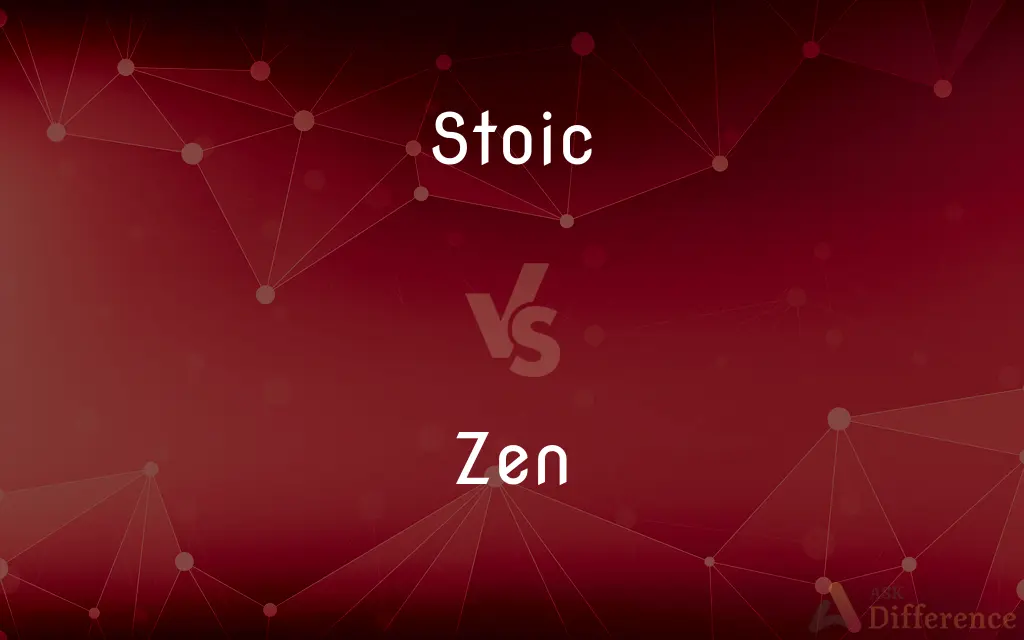Stoic vs. Zen — What's the Difference?

Difference Between Stoic and Zen
ADVERTISEMENT
Compare with Definitions
Stoic
One who is seemingly indifferent to or unaffected by joy, grief, pleasure, or pain.
Zen
Zen (Chinese: 禪; pinyin: Chán; Japanese: 禅, romanized: zen; Korean: 선, romanized: Seon; Vietnamese: Thiền) is a school of Mahayana Buddhism that originated in China during the Tang dynasty, known as the Chan School (Chánzong 禪宗), and later developed into various sub-schools and branches. From China, Chán spread south to Vietnam and became Vietnamese Thiền, northeast to Korea to become Seon Buddhism, and east to Japan, becoming Japanese Zen.The term Zen is derived from the Japanese pronunciation of the Middle Chinese word 禪 (chán), an abbreviation of 禪那 (chánnà), which is a Chinese transliteration of the Sanskrit word dhyāna ("meditation").
Stoic
Stoic A member of an originally Greek school of philosophy, founded by Zeno of Citium about 308 BC, believing that God determined everything for the best and that virtue is sufficient for happiness. Its later Roman form advocated the calm acceptance of all occurrences as the unavoidable result of divine will or of the natural order.
Zen
A Japanese school of Mahayana Buddhism emphasizing the value of meditation and intuition rather than ritual worship or study of scriptures.
Stoic
Seemingly indifferent to or unaffected by pleasure or pain; impassive
"stoic resignation in the face of hunger" (John F. Kennedy).
ADVERTISEMENT
Zen
A school of Mahayana Buddhism that asserts that enlightenment can be attained through meditation, self-contemplation, and intuition rather than through faith and devotion and that is practiced mainly in China, Japan, Korea, and Vietnam. Also called Zen Buddhism.
Stoic
Stoic Of or relating to the Stoics or their philosophy.
Zen
Also zen An approach to an activity, skill, or subject that emphasizes simplicity and intuition rather than conventional thinking or fixation on goals
The zen of cooking.
Stoic
(philosophy) Proponent of stoicism, a school of thought, from in 300 {{B.C.E.}} up to about the time of Marcus Aurelius, who holds that by cultivating an understanding of the logos, or natural law, one can be free of suffering.
Zen
(religion) enlightenment, particularly the kind acquired through Zen meditation.
Stoic
A person indifferent to pleasure or pain.
Zen
An approach to instruction, understanding, or an activity similarly emphasizing simplicity and intuition rather than conventional thinking or fixation on goals.
The zen of cooking... the zen of passing the bar exam... the zen of C++...
Stoic
Of or relating to the Stoics or their ideas.
Zen
(religion) Zen: of or related to Zen Buddhism, particularly its focus on indirect teaching of wisdom through riddles and stories.
Stoic
Not affected by pain or distress.
Zen
(colloquial) Wise, displaying enlightenment or similar wisdom, insightful, unburdened and free of worries, extremely relaxed and capable.
Stoic
Not displaying any external signs of being affected by pain or distress.
Zen
School of Mahayana Buddhism asserting that enlightenment can come through meditation and intuition rather than faith; China and Japan
Stoic
A disciple of the philosopher Zeno; one of a Greek sect which held that men should be free from passion, unmoved by joy or grief, and should submit without complaint to unavoidable necessity, by which all things are governed.
Zen
A Buddhist doctrine that enlightenment can be attained through direct intuitive insight
Stoic
Hence, a person not easily excited; an apathetic person; one who is apparently or professedly indifferent to pleasure or pain.
A Stoic of the woods, a man without a tear.
Zen
Street name for lysergic acid diethylamide
Stoic
Of or pertaining to the Stoics; resembling the Stoics or their doctrines.
Stoic
Not affected by passion; manifesting indifference to pleasure or pain; especially, bearing pain, suffering, or bad fortune without complaint.
Stoic
A member of the ancient Greek school of philosophy founded by Zeno;
A Stoic achieves happiness by submission to destiny
Stoic
Someone who is seemingly indifferent to emotions
Stoic
Seeming unaffected by pleasure or pain; impassive;
Stoic courage
Stoic patience
A stoical sufferer
Stoic
Pertaining to Stoicism or its followers
Share Your Discovery

Previous Comparison
Irradiate vs. Radiate
Next Comparison
Flint vs. Obsidian














































